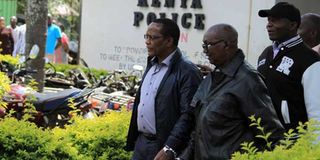Corruption has reached tipping point, now something must give

Sh9 billion National Youth Service scandal suspects are led to police vehicles from Muthaiga Police Station before being taken to Milimani Law Courts on May 29, 2018. PHOTO | JEFF ANGOTE | NATION MEDIA GROUP
What you need to know:
Corruption imposes an added cost on the arduous and burdensome cost of living.
Normally, cheaper Ugandan maize would lower the cost of maize meal in Kenya because it was significantly cheaper than the cereals board price.
We are all in some way reliant or dependent on the corruption chain, albeit often unknowingly.
There is something encouraging about the explosion of anger over the avalanche of revelations and disclosures of the corruption and thievery epidemic in Kenya.
They are bold and uninhibited. They are deeply factual and all formats of media have not shied away from reporting them but dug deeper. This is a distinct break from the past, when disclosures would come out in dribs and drabs and the media would be looking over its left and right cowing shoulder.
Look how long it took information about Goldenberg to come out, yet the series of scams is small fry compared to what is being dished up.
For a long time, many people saw my fervent anti-corruption stance as an exception rather than the rule. “It is part of life in Kenya” was one of the most common retorts.
BASIC EDUCATION
Corruption cuts all ways into our lives. Every man woman and child is a victim. Indeed, every entity gets affected. It degrades the standard of the basic goods and services to which we are entitled. Delivery of such services as basic education and healthcare would be way much better if they were not subjected to corruption and thievery. Corruption imposes an added cost on the arduous and burdensome cost of living. The quality of services is cheapened and goods cost more.
Take the most recent of the maize scams. Normally, cheaper Ugandan maize would lower the cost of maizemeal in Kenya because it was significantly cheaper than the cereals board price. But that is no more.
And it sucks us all in, including those who are not corrupt. We are all in some way reliant or dependent on the corruption chain, albeit often unknowingly.
COMMERCIAL ACTIVITIES
The supply of goods and services, commercial activities and, indeed, the country would literally grind to a halt.
We should not be taken in by hollow promises and the pretence of shock and horror by much of our political class. It is sheer unadulterated hypocrisy as many of them — high-, middle- or low-ranking — are part and parcel of it. They have joined the ‘eating brigade’.
We should bluntly ask whether there exists genuine political will to tackle corruption. Or is it a public relations exercise of smoke and mirrors?
We are promised extensive investigations. But how deep and extensive are they, when the policing and investigative agencies lack resources and competence or people are asked to investigate themselves?
EUROBOND
Expressions such as “we will leave no stone unturned” or “the culprits will be brought to book” litter our history. Where is the real action on the SGR, Eurobond and the scams in the Ministries of Energy, Health, Transport and Security, to name but a few?
It is not being cynical to say that only small fish get occasionally fried as per the cemetery scam. Yes, some people are taken to court. But therein lies the other weak link in the chain: Our police and investigative arms literally do not have the capacity to pursue the cases competently and thoroughly and collect sufficient evidence to secure a conviction.
I believe President Uhuru Kenyatta is genuine in his promise to purge corruption. But I am not so convinced about some in his team, even though they echo his words.
SLAYING CORRUPTION DRAGON
He is privy to information as to who are not and they should be removed from public office.
We must get seconded skilled first-class investigators from supporting donors such as Britain, the European Union and the US. Even countries with a commendable anti-corruption history, such as Singapore, should be approached.
Slaying the corruption dragon is no rocket science. The new prime minister of Malaysia, Mahathir Mohamed, has retrieved over $50 billion corrupt money so far. He has also had many former ministers, businessmen, judges and policemen arrested on corruption-related charges.
Mr Shaw is a public policy and economic analyst. [email protected]





